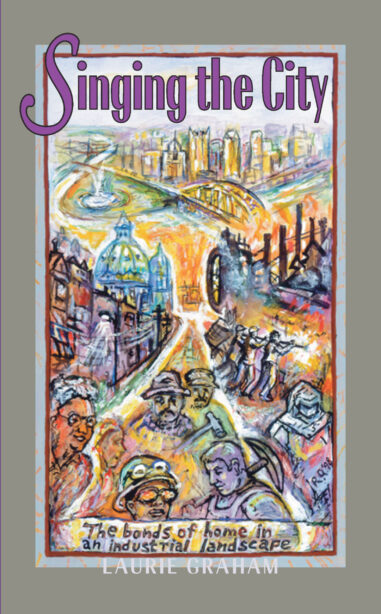Singing The City
The Bonds Of Home In An Industrial Landscape
Laurie offers a touching and poignant retrospect of a painful time in our past.
Request Exam or Desk Copy. Request Review Copy
Singing the City is an eloquent tribute to a way of life largely disappearing in America, using Pittsburgh as a lens. Graham is not blind to the damage industry has done—both to people and to the environment, but she shows us that there is also a rich human story that has gone largely untold, one that reveals, in all its ambiguities, the place of the industrial landscape in the heart.
Singing the City is a celebration of a landscape that through most of its history has been unabashedly industrial. Convinced that industrial landscapes are too little understood and appreciated, Graham set out to investigate the city’s landscape, past and present, and to learn the lessons she sensed were there about living a good life. The result, told in both her voice and the distinctive voices of the people she meets, is a powerful contribution to the literature of place.
Graham begins by showing the city as an outgrowth of its geography and its geology—the factors that led to its becoming an industrial place. She describes the human investment in the area: the floods of immigrants who came to work in the mills in the late nineteenth and early twentieth centuries, their struggles within the domains of Andrew Carnegie and Henry Clay Frick. She evokes the superhuman aura of making steel by taking the reader to still functioning mills and uncovers for us a richness of tradition in ethnic neighborhoods that survives to this day.
More Praise
Graham describes how Pittsburgh's geography and geology were factors in its industrialization the floods of immigrants who came to work in the mills in the late 19th and early 20th centuries; steel making lore and the loss of mills; and the urban spirit that honors commitment to the family, tradition, and hard physical work.
Early on we are treated to an evocative description of the destruction of a steel mill at dawn . . . The stories continue, from a brief geological history of the area, and an astutely researched and summarized history of Pittsburgh's industry and politics to a sad picture of a devastated town without purpose. Full of sympathetic characterizations of workers she interviews, evenhanded discussions of past captains of industry and the occasional legend, the book will likely make readers feel the urge to visit the place, if only to pay homage to the town that produced the material with which our country was built.
Singing the City is a smart, lyrical prose poem that illuminates the beauty in industrial landscapes. Laurie "Graham widens the circle within the community of nature writing by showing us what it means to embrace our cities, a subject too often neglected in our exploration of place. Graham locates an urban spirit that honors the hard work, the cultural traditions, the commitment to family and home that root us in a landscape. Her keen sensibilities combine with a precision of language and, most important, a love for her city that make this remarkable book, quite simply, an act of communion.
We have waited too long for Laurie Graham's voice—the voice that has the range and passion to apprehend the rhythms of our industrial spaces, of our changing cities. Hers is a smart, imaginative articulation of the redemptive spirit in the dignity of work, the magnificent structure of a steel mill, the complicated relationships of people and landscape. Singing the City instructs us, embracing the ambiguities of what it means to live with industry. Graham's visionary song redefines wilderness by relocating the reader inside the wild natural heart of the city.
Laurie Graham writes with the fresh eye of the enthusiast and, in Singing the City, with the grounded awareness of the native dweller. In this extended essay about Pittsburgh, physical labor, and human community, we're sustained by Graham's regard for, and intelligence about, each of these elements, and by the clarity of her language. It's a beautifully told story.
You don't have to be from Pittsburgh to appreciate Singing the City. . . . It's a book that will resonate with anyone, anywhere, who is interested in the complex relationship between urban landscape and human spirit.
Laurie Graham goes so far as to contend that a landscape can work its way into our DNA. Hence, she claims in Singing the City, her sense of coming home when she moved to Pittsburgh, where previous generations of her family had lived—though she herself had grown up in Chicago. . . . This book is perhaps best appreciated in the context of two others about Pittsburgh: An American Childhood, Annie Dillard's superb memoir of her early years in Squirrel Hill, a prosperous neighborhood within the city limits, and American Elegy, Jeffrey Simpson's eloquent investigation into his family's life in Parnassus, a small town in Pittsburgh's shadow. Both Dillard and Simpson chronicle the peculiarities of the relentless Calvinism that held sway among descendents of the city's early settlers, Scotch-Irish immigrants who established a Presbyterian stronghold and emerged as the ruling class. Graham rounds out the picture by delineating the work ethic of the city's minorities, mostly Eastern European and Roman Catholic.
192 Pages, 5.7 x 9 in.
October, 2002
isbn : 9780822957928
about the author

Laurie Graham was an editor at Scribners for eighteen years and is the author of Rebuilding the House (1990), a memoir, which was selected as a New York Times Notable Book of the Year. She lives in Pittsburgh.
learn more

